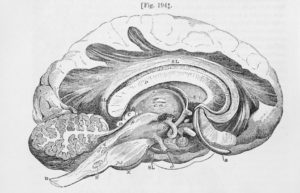Therapist Aaron Beck was the grandfather of Cognitive Behavioural Therapy (CBT) – a system of therapy which in a nutshell, teaches people to recognise the patterns of thinking that aren’t serving them well and to question unhelpful thoughts and feelings rather than just going with them willy-nilly and spiralling into down moods. Many therapists, like myself, combine ideas from CBT with other forms of therapy according to the needs of their client and personal style. Pure CBT presents a tidy model of therapy: Questioning unhelpful thoughts, then replacing them with more self-supporting thoughts. Lovely in theory, but of course our habits of mind can be ingrained and hard to shake – that’s why they’re habits after all – so I typically combine a great deal of other work to understand and deal with habits of mind more broadly and deeply.
Without understanding, unhelpful habits of mind can get us in a pickle in relationships as well as in our own moods because self-defeating habits of thinking can seep into our view of ourselves, others and the world. Dr Beck named a number of very common unhelpful habits of mind that it’s great to know about so we can be aware how they might be creeping into our experience and creating sadness or stress.
The first is overgeneralising, where we categorise people or experiences according to inaccurate broad criteria that ignore the myriad possible variations in people and context. For example – ‘All men are into cars’ ‘All women want to have a baby’ or ‘I’m always the one who misses out’. While some of those things may be true for some people at some times, generalisations tend to steamroll the uniqueness of ourselves and others.
Black and white thinking. ‘It’s my way or the highway’ is just one of the popular but unhelpful attitudes that tend to shut down collaboration and conversation in relationships, and it’s an example of black and white thinking. Fact is, most things in life and particularly in our relationships, come in many shades of grey – that’s what keeps them interesting!
Jumping to conclusions. We may do this sometimes, then deeply regret it when we realise it wasn’t how we imagined. Question it when you start jumping ahead with a chain of assumptions that don’t feel good. Take a breath. You may not be on the right track so there’s no point continuing down that road until you’ve got some more reliable information.
Imagining the worst, which I like to call catastrophizing, can create anxiety and panic. It usually involves jumping to the worst conclusions without evidence. Decide to wait for the facts to emerge before habitually thinking the worst.
Taking everything personally. This means blaming yourself for everything that happens and tending to believe that other people notice your every mistake and you’re consistently the focus of their attention. The fact is that most people, including your partner are more aware and focussed on their own experience of any given situation, because that’s just how we’re made. It can feel liberating to remember it’s not all about you all the time – in a good way!
If you need help with this stuff I’m here. Drop me an email, or download my free eBook Hot Devotion at www.drdebracampbell.com
Just BE the love that you ARE x







I did a course called Dialectic Behaviour Therapy (DBT). A specific type of cognitive-behavioral psychotherapy developed in the late 1980s by psychologist Marsha M. Linehan to help better treat borderline personality disorder. Since its development, it has also been used for the treatment of other kinds of mental health disorders. Designed to help people change patterns of behavior that are not helpful, such as self-harm, suicidal ideation, and substance abuse. Also Dr. Linehan found DBT found it worked to help better treat borderline personality disorder. DBT is a highly effective, researched, internationally recognized treatment for people with significant emotional and relationship difficulties.
DBT is a 12 month treatment for people who have difficulty managing their emotions, relationships and choices. It involves attendance of a weekly 2.5 hour group with a maximum of 10 people, and 1 hour weekly individual sessions. DBT covers 4 modules teaching 4 sets of practical skills. The modules teach a set of skills for managing emotions, relationships and choices.
DBT is a skills-based program. The groups are like an educational class, with handouts and practice exercises. Groups do not involve participants discussing their personal history or issues, and are well structured. Individual sessions are also structured, and give time for participants to discuss privately how what they are learning in the group applies to their individual situation.
I am sure you have heard of DBT, at the time I made the decision to spend 12 months of my life to try and turn it around I did a lot of research on the therapy and found that I would learn a set of skills to stand me in good stead. I had only just finished my DBT course and you bought out your course and I found in the School of Love that combined, if I practice the skills of your course and my DBT skills; then I am on the road to happiness in my relationships, sure of the choices I make and of course I still have much to learn.
Thank you Dr Deb, for helping me be the person I would like to be.
With love
Debra Swinden (nee Tunks)
I found Schema Therapy an interesting and helpful experience. It is an extension to Cognitive Behaviour Therapy. Simply put, identifying powerful thought patterns that go right back to childhood which are so ingrained we don’t notice them.